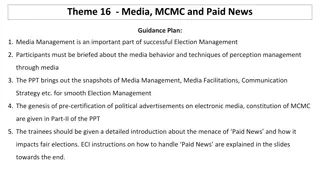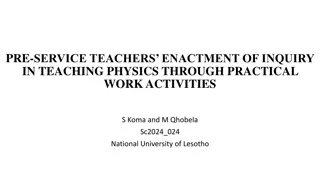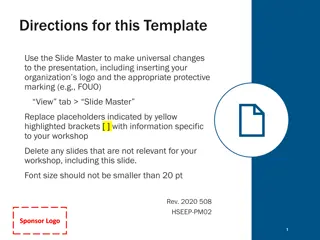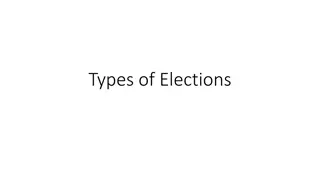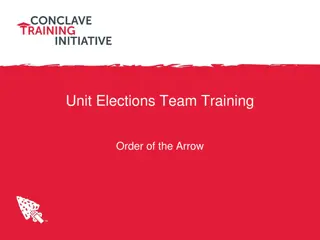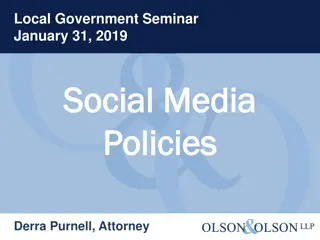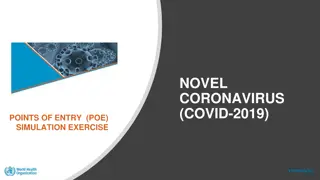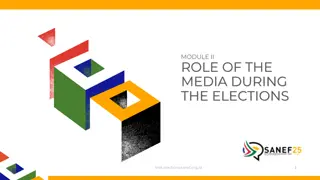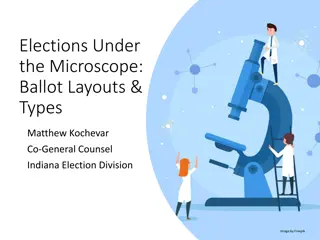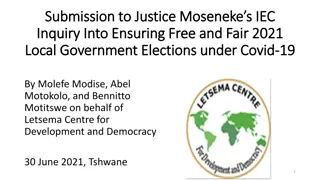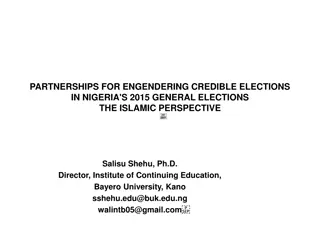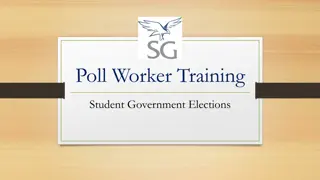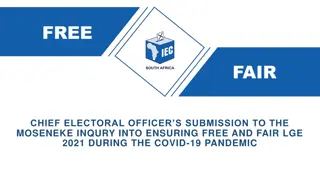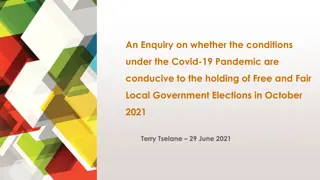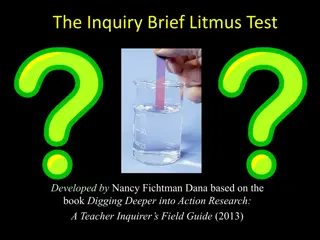Media Preparedness for Local Government Elections During COVID-19 Inquiry
This submission focuses on the crucial role of the media in ensuring free and fair elections during the COVID-19 pandemic. Media monitoring organizations aim to promote ethical media practices and enhance media quality to empower the public in making informed political decisions. Key areas of concern include access to election-related events, internet access, disinformation, and safety of journalists. Regional and international guidance, along with health measures for electoral gatherings, are also highlighted to ensure a transparent and inclusive electoral process.
Download Presentation

Please find below an Image/Link to download the presentation.
The content on the website is provided AS IS for your information and personal use only. It may not be sold, licensed, or shared on other websites without obtaining consent from the author.If you encounter any issues during the download, it is possible that the publisher has removed the file from their server.
You are allowed to download the files provided on this website for personal or commercial use, subject to the condition that they are used lawfully. All files are the property of their respective owners.
The content on the website is provided AS IS for your information and personal use only. It may not be sold, licensed, or shared on other websites without obtaining consent from the author.
E N D
Presentation Transcript
Justice Moseneke Inquiry on Free and Fair Justice Moseneke Inquiry on Free and Fair Local Government Elections During COVID Local Government Elections During COVID- -19 19 Presented by William Bird, Director of Media Monitoring Africa Supported by Avani Singh, Director of Power Singh Inc.
Not Not- -for since 1993. for- -profit organisation profit organisation that has been monitoring the media Objective Objective: To promote the development of a free, fair and ethical media culture media culturein South Africa and the rest of the continent. free, fair and ethical Seeks to address media ethics, media quality and media freedom through a human rights human rights- -based approach based approach. About Media Monitoring Africa Over 28 years of experience in media monitoring and direct engagement engagement with the media, civil society, state institutions and the public. media monitoring and direct Proven track record of demonstrating leadership, creativity and progressive approaches progressive approaches to meet the changing needs of the media environment. leadership, creativity and For more information, please visit www.mediamonitoringafrica.org www.mediamonitoringafrica.org.
Focus of this submission on media preparedness cover the Local Government Elections. media preparedness to Constitutional mandate Constitutional mandate in terms of section 16(1) of the Constitution. Necessary to recognise the important role played by the media the media particularly in the context of elections. important role played by Overarching considerations Enable the public to make informed political decisions and hold political actors to account hold political actors to account. informed political decisions Due to limited election observation missions, media will play a heightened role heightened role in ensuring vigilance and scrutiny. Confident Confidentthat the majority of media organisations are in a position to meet the task meet the task ahead of them.
Key regional and international guidance Media access to key events during the election period Summary of submissions Internet access and zero-rating of election-related content Disinformation during the election period Safety of journalists
Regional and International Guidance
Health measures enforced without discrimination Update the electoral calendar Electoral gatherings and campaigns Older persons and persons with co- morbidities Physical distancing and hygiene protocols Sanitisation of polling stations Alternative forms of voting No abuse to prevent anyone from voting Outcome of the elections Prevent, investigate and prosecute human rights violations Virtual election observation Statement of the African Commission
Promote access to the internet and other technologies Refrain from limiting ability of media and journalists to access public communications Media must enjoy robust access to sources of official information Joint Declaration on Freedom of Expression and Elections Prohibit Promote digital media and information literacy dissemination of statements intended to obstruct right to vote Address online disinformation and promote independent fact-checking Caution over direct targeted political advertising
Access to Key Events During the Election Period
Section 8(b) of the Electoral Code Section 8(b) of the Electoral Code: Every registered party and candidate may not prevent access by members of the media to public political meetings, marches, demonstrations and rallies. Applies equally whether taking place in virtually virtually. place in- -person or person or Also important to have access to other election processes processes, such as voting stations, counting of votes and results operation centres. other election- -related related Media access Technological innovations Technological innovations should be harnessed so that members of the media can perform their functions without being physically present. Journalists should be provided with permits that allow them to travel freely travel freely and be recognised as essential workers workers under the COVID-19 regulations. essential
Internet Access and Zero- Rating of Election-Related Content
(1) States shall facilitate the rights to freedom of expression and access to information online facilitate the rights to freedom of expression and access to information online and the means necessary to exercise these rights. (2) States shall recognise that universal, equitable, affordable and meaningful access to the internet universal, equitable, affordable and meaningful access to the internet is necessary for the realisation of freedom of expression, access to information and the exercise of other human rights. (3) States shall, in cooperation with all relevant stakeholders, adopt laws, policies and other measures to provide universal, equitable, affordable and meaningful access to the internet without measures to provide universal, equitable, affordable and meaningful access to the internet without discrimination discrimination, including by: adopt laws, policies and other Declaration of Principles on Freedom of Expression and Access to Information in Africa (a) developing independent and transparent regulatory mechanisms for effective oversight regulatory mechanisms for effective oversight; (b) improving information and communication technology and internet infrastructure information and communication technology and internet infrastructure for universal coverage; (c) establishing mechanisms for regulating market competition encourage diversity; regulating market competitionto support lower pricing and (d) promoting local access initiatives local access initiatives such as community networks for enabling the increased connection of marginalised, unserved or underserved communities marginalised, unserved or underserved communities; and (e) facilitating digital literacy skills digital literacy skills for inclusive and autonomous use. (4) In providing access to the internet, States shall take specific measures marginalised groups marginalised groupshave effective exercise of their rights online. specific measures to ensure that (5) States shall adopt laws, policies and other measures to promote affordable access to the internet for children for children that equips them with digital literacy skills digital literacy skills for online education and safety, protects them from online harm and safeguards their privacy and identity. promote affordable access to the internet
The internet is crucial for journalists to verify information and keep the public updated on the measures being taken to contain the spread of COVID-19. States should take all measures to guarantee, respect and protect the right to freedom of expression and access to information through ensuring access to the internet and social media services, especially during the COVID-19 pandemic. Imperative that all members of the public have access to election-related content that is made available online, without discrimination and regardless of the high data costs in the country. Only way to ensure equitable access to information on key issues of democratic importance is for access to election-related content to be zero-rated. Practically, this would work in a similar manner to the zero-rating of websites relating to COVID-19, such as through an application process to the IEC following engagement with internet service providers. Internet access and zero-rating
Disinformation During the Election Period
Joint Declaration on Freedom of Expression and Fake News , Disinformation and Propaganda Section 89(2) of the Electoral Act Section 4(1)(b) of the Electoral Code of Conduct
Commitment to respecting and protecting the media and press freedom during the election period Threats or attacks on journalists must be condemned in the strongest terms and dealt with by the party or candidate Threats or attacks on journalists must be investigated by the IEC and relevant authorities with swift remedies provided COVID-19 regulations and protocols must be adhered to by the IEC, parties, candidates, voters and supporters
In a democratic society, then, the mass media play a role of In a democratic society, then, the mass media play a role of undeniable importance. undeniable importance. They bear an obligation to provide citizens both with information and with a platform for the exchange of ideas which is crucial to the development of a democratic culture. As primary agents of the dissemination of information and ideas, As primary agents of the dissemination of information and ideas, they are, inevitably, extremely powerful institutions in a democracy they are, inevitably, extremely powerful institutions in a democracy and they have a constitutional duty to act with vigour, courage, and they have a constitutional duty to act with vigour, courage, integrity and responsibility. integrity and responsibility. The manner in which the media carry out their constitutional mandate will have a significant impact on the development of our democratic society. If the media are scrupulous and reliable in the performance of their constitutional scrupulous and reliable in the performance of their constitutional obligations, they will invigorate and strengthen our fledgling obligations, they will invigorate and strengthen our fledgling democracy. If they vacillate in the performance of their duties, the democracy. If they vacillate in the performance of their duties, the constitutional goals will be imperilled. constitutional goals will be imperilled. The Constitution thus asserts and protects the media in the performance of their obligations to the broader society, principally through the provisions of s 16. Khumalo v Holomisa If the media are




